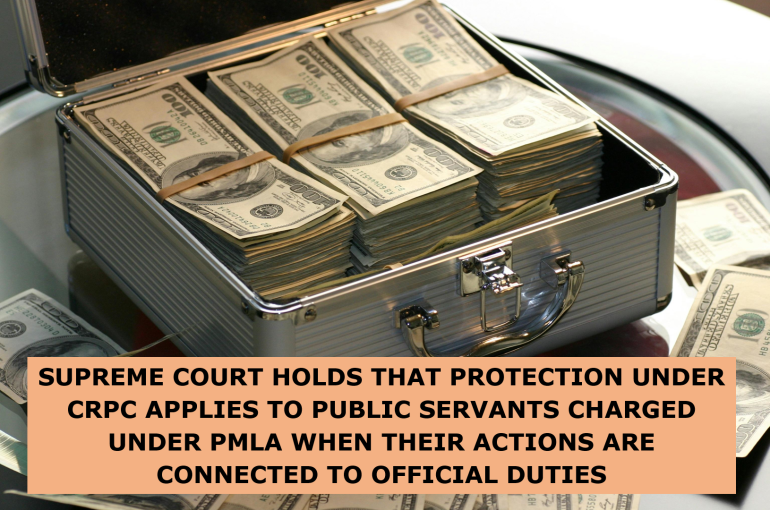SUPREME COURT HOLDS THAT PROTECTION UNDER CRPC APPLIES TO PUBLIC SERVANTS CHARGED UNDER PMLA WHEN THEIR ACTIONS ARE CONNECTED TO OFFICIAL DUTIES
A two Judge Bench of the Hon’ble Supreme Court comprising of Justice Abhay S. Oka and Justice Augustine George Masih passed a judgement dated 06.11.2024 in the matter of Directorate of Enforcement v. Bibhu Prasad Acharya etc. Criminal Appeal Nos. 4314-4316 of 2024 wherein the Hon’ble Bench held that prior sanction is required for prosecuting public servants as Prevention of Money Laundering Act 2002 does not completely supersede the Code of Criminal Procedure 1973.
Facts
The Appellant had filed Complaints against the Respondents under Section 44(1) (b) of the Prevention of Money Laundering Act, 2002 (PMLA) (Offences triable by Special Courts). The Respondents were charged under the offence of Money Laundering as per Section 3 (Offence of Money Laundering) and Section 4 (Punishment for Money Laundering) of the PMLA. The Special Court took cognizance of the complaints and both the Accused were summoned by the Ld. Court.
The Complaint was filed against the 1st Respondent alleged that he conspired with Shri Y.S. Jagan Mohan Reddy, who was the State’s Chief Minister and gave M/s. Indu Tech Zone Private Ltd. 250 acres of land for the SEZ project by breaking established rules, regulations, and procedures and also indulged in money laundering.
The Complaint against the 2nd Respondent alleged that he was in a conspiracy with Shri Y.S.Jagan Mohan Reddy, and he provided favour to India Cement Limited by allotting an additional 10 lakh litres of water from River Kagna without referring the matter to Interstate Water Resources Authority and by violating the existing norms, regulations and procedures.
Later, the Respondents both being public servants, filed Petitions bearing nos. CRLP-3988/2016 and CRLP-11942/2018 before the High Court of Telangana challenging the cognizance taken by the Special Court and also filed Writ Petition bearing no. WP-2253/2018 requested for quashing of the Complaints.
The contention placed by the Respondents was that they both were public servants and therefore, it was necessary to obtain a prior sanction under Section 197(1) (Prosecution of Judges and public servants) of Code of Criminal Procedure 1973 (CRPC). The Writ Petitions were allowed by the High Court and it quashed the orders passed by the Special Court for taking cognizance. Hence, this led to filing of Appeal by the Directorate of Enforcement (Appellant).
Issues
- Whether a prior sanction for prosecuting the public servants is required as per Section 197 (1) CRPC?
- Whether the PMLA supersedes the CRPC and have an overriding effect over it?
Decision by the Supreme Court
The main contention raised by the counsel for the Appellant was that as per Section 71 of PMLA (Act to have overriding effect), the PMLA has an overriding effect over other provisions including the CRPC, thus the PMLA provisions must supersede CRPC and prior sanction was unnecessary in this case.
The Apex Court observed that the two conditions required under Section 197(1) for prior sanction i.e. being a public servant removable only by government sanction and acting in discharge of official duties were satisfied for both Respondents. The Hon’ble Court also found that the alleged acts (land and water allocations) were connected to the Respondents’ official roles, thus falling within the scope of their duties.
The Supreme Court after hearing the arguments from both sides, noted-
“18 Section 71 gives an overriding effect to the provisions of the PMLA notwithstanding anything inconsistent therewith contained in any other law for the time being in force. Section 65 of PMLA is a prior section which specifically makes the provisions of the CrPC applicable to PMLA, subject to the condition that only those provisions of the CrPC will apply which are not inconsistent with the provisions of the PMLA.”
Thus, when a particular provision of CrPC applies to proceedings under the PMLA by virtue of Section 65 of PMLA, Section 71 cannot override the provision of CrPC.
The Hon’ble Court also held that if Section 71 is held applicable to such provisions of the CrPC, which apply to the PMLA by virtue of Section 65, such interpretation will render Section 65 ineffective and no law can be interpreted in a manner which will render any of its provisions redundant.
The Supreme Court held that the overriding provision of Section 71 in PMLA does not negate CrPC’s Section 197(1) because Section 65 specifically mandates CrPC’s application unless explicitly inconsistent.
Hence, the Hon’ble Supreme Court provided that cognizance under the offence of Section 3 and 4 of PMLA by the Special Court was obtained without the prior sanction from the Government.
Thus, the Apex Court upheld the decision of the High Court stating that prior approval of the government was required for prosecuting a public servant under Section 197(1) CRPC.
Conclusion
The Appeals by the Appellant were dismissed, affirming that the protection under Section 197(1) of CrPC applies to public servants charged under PMLA when their actions are connected to official duties. However, the Apex Court stated that it will be open for the Appellant to move the Special Court to take cognizance of the offence against the Respondents if a sanction under Section 197(1) of CrPC is granted in future and this liberty will be subject to legal and factual objections available to the respondents.
ARJAV JAIN
ASSOCIATE
THE INDIAN LAWYER & ALLIED SERVICES





































Leave a Reply